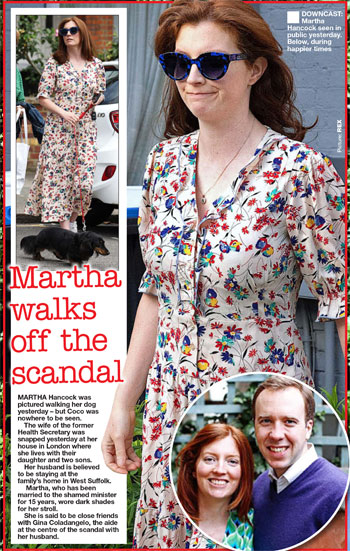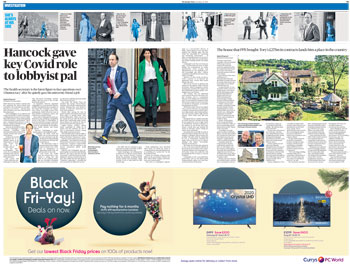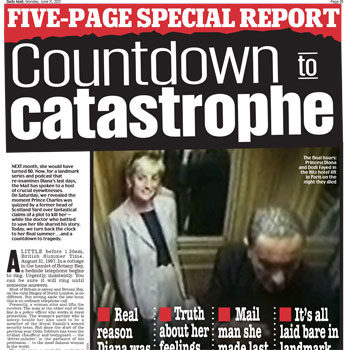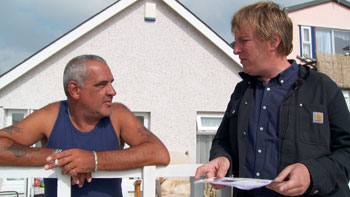
Scoop of the Year?
When the awards season comes around at the turn of the year, The Sun can expect to be in with a good shout for Scoop of the Year for its Matt Hancock clinch exclusive.
The story was certainly sensational, swiftly bringing down a Secretary of State who had survived being found in breach of the law over procurement contracts, being denounced by Dominic Cummings as a recidivist liar and, apparently, being dismissed as “******* hopeless” by the Prime Minister.
The ensuing outcry was so loud that for once it drowned out Downing Street’s all-purpose escape route: “The matter is closed”. Not only was it not closed then; it is not closed now that Hancock has quit. (Any more than the Barnard Castle matter is closed – the reverberations are still being felt to this day – or Priti Patel’s bullying inquiry is a matter closed – there’s still an industrial tribunal in the works).
There are many, many questions still to be answered with regard to Mr Hancock’s conduct and his eventual downfall. Even before Cummings first wielded his knife and then twisted it, it was clear that, just as Dominic Raab was the “designated survivor” when Covid was ripping through Westminster, Hancock was the “designated fallguy” on whom all pandemic blame would be heaped – when the time came.
Was now the time? Was it a Johnson loyalist or a Cummings admirer who tampered with that CCTV camera and then leaked its bounty to The Sun? Someone who wanted to help the Prime Minister by creating the opportunity to remove a minister who had become a liability but who could not, in all conscience, be sacked after so much “hard work”? Someone who wanted to damage the Prime Minister by proving Cummings right in his assessment? Or simply someone who had had enough of the way the department was being run or was outraged by the way the boss was carrying on?
Maybe the clue lies in the choice of outlet for the exclusive. The Sun is almost slavishly pro-Johnson, so it would be an unlikely option if the objective were to damage the Government; the Mail would be more logical, given its strident criticisms of some aspects of the way the pandemic has been handled – and the fact that it is now the biggest-selling and probably most politically influential title.
Which brings me back to the notion of “scoop of the year”. What are the requirements for such a title? Is it enough that it is something sensational that you have to yourself? No. It has to have ramifications. But do you need actually to have done something to get that exclusive? If the envelope just drops on your doormat, does that count? Well, if you’ve cultivated the contacts and built a reputation for a particular type of story, then probably. But if you’re just being used as a vehicle for someone with an axe to grind, probably not.
And what about payment? If this is the work of a genuine whistle-blower concerned about misbehaviour in public office, then money should not have changed hands. The Sun knows all about paying public servants, given its Operation Elveden experience of seeing many of its staff put on trial – even before the Bribery Act made it quite clear that cheque books should not be opened.
Whether ministers and their staff – or anyone, indeed – should be filmed while going about their daily work is a question for others; for journalists the issue is whether the publication of stills and videos taken on clandestine cameras is legitimate and in the public interest. In this case, there can be surely little doubt that it was.
But I still suspect that, rather than demonstrating its intrepid, fearless journalism, the Sun has been used. The question is by whom?
The issue is whether the publication of stills and videos taken on clandestine cameras is legitimate and in the public interest.
Innocent party

Naturally, the moment the Hancock affair was out in the open, the Fleet Street vultures gathered on the rooftops to await their turn at a bit of evisceration. There was much outpouring of sympathy for Martha, the wronged wife, whose photograph appeared in most papers as she walked her dog. She was wearing a floral dress. She was still wearing her wedding ring. These, apparently, are the things people need to know. And, of course, to feed that hunger for knowledge about someone most readers had never heard of and certainly didn’t care about the day before, there had to be a battery of photographers outside her house.
This was a woman who two days earlier had been told by her husband – presumably because he’d just been alerted by the Sun to the pile of poo about to land on him – that he had been conducting an affair and was now going to leave her and their children. A woman whose world had come crashing down and whose eight-year-old had been woken in the night by his father to be told he was moving out.
It’s true that these details are revealing about a man who was at the time clinging to public office. We want the “human stories” behind the politics. But that doesn’t take away the nasty taste left by the way they find their way into print.
She was wearing a floral dress. She was still wearing her wedding ring. These, apparently, are the things people need to know.
Asking the questions that matter

Hancock himself, however, was obviously a legitimate target and the questions raised were not confined to his relationship with Gina Coladangelo or their flouting of social distancing rules in the workplace. There were the issues of how she came to be working for him in the first place, where they stayed during a G7 trip, how she came to have a Westminster pass and much more.
And then there was all the procurement stuff, the awarding of contracts to friends from the pub, the failure to “put a protective ring” round care homes. Call it chumocracy or cronyism, if you like, but the whiff of corruption has been wafting around Hancock for more than a year. Jolyon Maugham of the Good Law Project has been doggedly taking this issues to court – and winning. But, until now, he has been not a public-spirited hero but a “fox-killing Remainer”.
Maugham has been doing what the Press has mostly failed to do: ask awkward questions beyond “when can we go on holiday, when can we go to the pub?” When he won his first case in February and the High Court found that Hancock had unlawfully failed to publish details of PPE contracts worth billions, the Times thought the ruling worth only one paragraph on page nine. You could say that interest has grown since then.
But one paper was already on the case: The Sunday Times. Last November it devoted a spread to cronyism, focusing on two cases: a man who had made so much profit from the pandemic that he was able to buy a £1.5m house and 100 acres of land in the Cotswolds – and Ms Coladangelo. All the questions that needed asking – and still need answers – are there. It’s worth going back and taking a look.
Maugham has been doing what the Press has mostly failed to do: ask awkward questions.
When two become one

The two Times titles have always fiercely defended their independence of each other, pointing out to anyone who dares lump them together that they are completely separate, with their own staffs and news values. For example, as with the Mail titles, they went in different directions before the Brexit referendum.
But all that is about to change. However much the editors may claim the opposite.
When Rupert Murdoch bought the papers in 1981, a special law was passed to make sure that he didn’t interfere in editorial; independent directors were appointed to make sure that he kept his nose out and that the two papers kept their distinct identities.
In 2013, when Murdoch wanted rid of James Harding, the independent directors put up a bit of a fight, so he was able only to move John Witherow across from the Sunday to the daily and replace him with Martin Ivens as “acting” editors. But the directors eventually bowed to the inevitable and the two men were confirmed in office, just as Rupert wanted.
The next step was to ask MPs to relax the rules so that there could be some joint staffing – mainly pooling subbing teams (subs are always the first to be shunted around; they are underrated, seen as insignificant and assumed not to have the sort of brand loyalty associated with reporters and columnists who get their names on their work. If only people realised that they generally have more, not less, awareness of their paper’s unique flavour and are not merely jobbing mercenaries but people who take pride in protecting the product.)
Anyway, that happened. So great areas of news, features and sport are produced by single teams.
Now Murdoch wants MPs to take the final step and remove all impediments to non-interference.
In an email to staff, Witherow says he wants to be “free of outmoded restrictions and third-party oversight” so that the titles can “accelerate ambitious plans” to reach digital audiences. The editors would have “editorial independence” written into their contracts and the two titles would retain their “distinct voices in key areas”. But the independent directors would go, to be replaced by an independent committee “that could adjudicate any complaints” – though who would do the complaining and about what is not specified. He’s clearly not talking about the sort of things that go to IPSO.
It is an interesting email. For example, the distinct voices would apparently be heard only in “key areas”. So the leader and possibly the op-ed? The role of the independent directors is characterised three times as “government oversight” – with its implications of state interference in a free Press. No one else has to put up with these obligations. It isn’t fair. You can almost hear the stamping of angry little feet.
With Oliver Dowden as Culture Secretary, there is little doubt that Mr Murdoch – whose representatives had 40 meetings with ministers in the first 14 months of the Johnson administration, more than twice as many as any other media organisation – will get his way. That will mean staff cuts, seven-day working and a whole load of other negatives for the people who work for the titles. And the proprietor will be allowed to intervene at will.
It should be remembered that the restrictions were imposed because of fears that this particular proprietor wielded too much power. And that was before he invented Sky or Fox News. The Witherow email is right in that the media landscape has changed. It is true, for example, that other organisations have built up portfolios that give them vast reach – one of them, which owns six national papers, is actually called Reach. But Murdoch has also gained more power and influence as his empire has grown over the past forty years.
Now he’s asking for more. And, just when the Government claims to be looking to increase plurality in media ownership by backing GB News and selling off Channel 4, he’s almost certain to get it.
That will mean staff cuts, seven-day working and a whole load of other negatives for the people who work for the titles.
Whose face fits?

So England beat Germany, watched – according to Gary Lineker’s calculations – by more than 23m people.
With such an audience, which presumably accounted for everyone who was interested, one wonders why it was necessary for the BBC News at Ten to devote quite so much time at the front of its bulletin to the match – to the point that it even ran a profile of Raheem Sterling before moving on to the next item. It did the same with the 0-0 draw against Scotland and the obvious argument would be “Look at the huge interest. It’s what people care about”.
Ditto, the newspaper coverage – as evinced by headline of the day (from the Telegraph) “England make history and create mass hysteria”. Even the Mail went all out on football – in Wimbledon fortnight, the one sporting event it takes seriously – although in a nod to its traditional audience, the picture that dominated the top half of the front was not a player, but a comely young lady (as it had been after the two previous wins).
Most papers went for Harry Kane, the captain and scorer of the second goal. For football fans – as opposed to maybe-not-quite-so-interested editors and news picture editors – that was probably a bit odd, given that Kane has had a lacklustre tournament to date and didn’t do an awful lot apart from that goal. Sterling, scorer of three of his country’s four goals so far – including the first on Tuesday – might have seemed the more obvious candidate.
And there’s an equally obvious reason as to why he might not have been. Not that anyone would admit that. Rather, the news argument would probably be that Kane is the “face” of English football; the most recognisable player to non-football fans. But you can’t be what you can’t see: you don’t become recognisable if your face isn’t shown – and if your target audience is non-football fans, why devote so much space to the match up front? It doesn’t add up.
OK, I’m being perverse. England v Germany is symbolic. We all know the history – and thankfully, this week we were largely spared the Second World War analogies, which is quite an achievement given the way the Brexit debate and Johnson’s Churchillian aspirations have been ramming them down our throats for five years. There is also always the fear that this might be the last hurrah. We must celebrate while we can – although some TV pundits and commentators have been a bit crass talking about the country needing something to cheer “after all it has been through over the past 18 months”, as though the pandemic hadn’t caused hardship anywhere else (it has: the clue is in the word). But there is always the danger of peaking too soon. Supposing football really is “coming home”. Suppose England actually win. Best to keep something in reserve.
But back to those picture choices: the Guardian and Mirror both opted for the players’ celebratory scrum after Kane scored; the Times, Telegraph, Metro, Express and i all went for Kane, while only the FT and the Sun gave Sterling centre stage. Good for them. Especially the Sun for whom the front was a complete about-turn from its “Obscene Raheem” front five years ago to the day.
Sterling, scorer of three of his country’s four goals so far – including the first on Tuesday – might have seemed the more obvious candidate.
Open mouthed

Personally, I think those papers that used Kane – and the group scrum – got it wrong. I think the Sun picked the wrong Sterling picture. And I think most got it wrong the day before, too, with their Andy Murray, Kane and Gareth Southgate photographs. Not for all the reasons listed above, but for pure aesthetics. There is absolutely nothing appealing about a picture of a man with his mouth wide open or his tongue out. These are all supposed to be celebratory photographs, but all I see is aggression – particularly in Kyle Walker’s grimace in the group shot. They may show grit, determination and other characteristics deemed admirable – especially in a sportsman – but attractive they ain’t.
Remembering Diana

Diana Princess of Wales would have been 60 today. You probably haven’t noticed. The supplements have been printed; a statue is to be unveiled by her sons. The Mail, as ever, has leapt on the chance to run a “Countdown to catastrophe” special on the Princess’s last days, to stir controversy over the statue guest list and to turn the would-have-been birthday into an attack on “merciless Meghan”. Let no royal stone remain unturned. All that is par for the course.
Meanwhile, every second columnist has apparently been to a séance and emerged with a unique insight into what the Princess would have thought, said and done had she not died 24 years ago. On one thing they were agreed: she would have been devastated to see the rift between “her boys”.
Of course she would. But without her death, the trauma of walking behind her coffin and the emotional baggage the whole post-mortem Diana industry created, that rift probably wouldn’t have been there.
Great journalism

And finally, back to where we came in: awards time. The Sun’s Hancock scoop may have been the result of cultivated contacts or something falling into its lap. But this week, two sets of journalists who definitely went out of their way to uncover matters of real public interest have been recognised. The Orwell Prize for Journalism has been awarded to The Guardian’s John Harris and John Domokos for their “Anywhere but Westminster” series, which has been running for ten years but this year has focused on the pandemic. It’s a wonderful premise for our too London-centric media: to get out of the capital, out of the political bubble and see how policies and events affect people around the country – people we tend only to take notice of when there’s an election round the corner.
Which is not to say that you can’t do good journalism right at the heart of power – as this year’s Paul Foot award demonstrates. That went to Robert Smith and FT colleagues for their work on Lex Greensill, from the financial collapse to the David Cameron lobbying scandal.
Proper journalism that has nothing to do with football or royals. And that – not the “right” to harass a cuckolded wife – is why we defend the free press.
Liz Gerard’s Notebook is a fortnightly column published in the InPubWeekly newsletter. To be added to the mailing list, enter your email address here.










